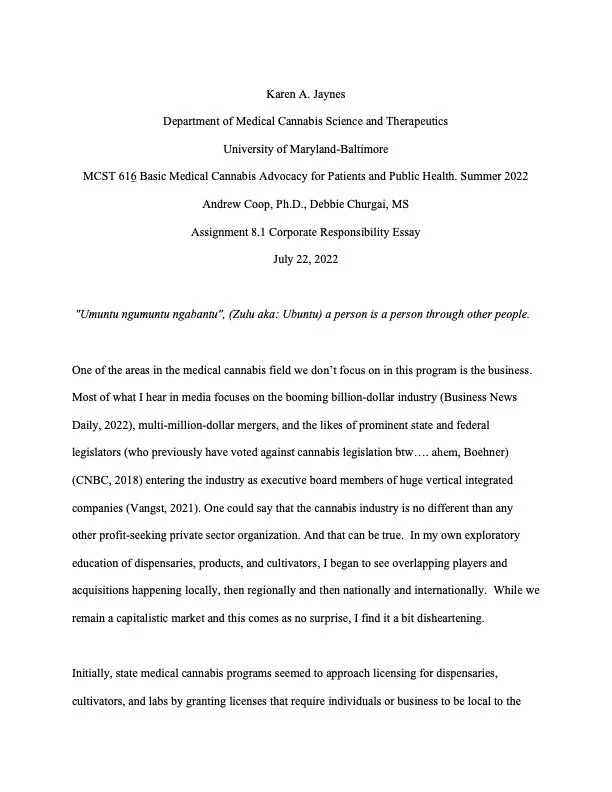Medical Cannabis Science & Therapeutics
Graduate Studies Portfolio
Program Highlights and Career Goals
From the first course in this program that elucidated the history, popular culture, and policies of medical cannabis, to my a final class on research posing the question about stigma and therapeutic effect, this program has come full circle, giving me a renewed focus and inspired purpose for the next tier of my professional career.
Courses, lectures, conversations, and study throughout our program were generous in offering comprehensive and wide-ranging medical cannabis science, critical thinking rationale, regulatory and legislative perspective, foundational scopes of pharmacology, pharmacognosy and genetics through understanding and evaluating research and therapeutic deduction via evidence-based medicine and patient care priority.
I am excited focusing my post graduate professional energy on educating and informing federal regulatory change for medical cannabis and teaching on all levels, the knowledge that I have gained as a student at the University of Maryland-Baltimore in the Medical Cannabis Science and Therapeutics graduate program.
I am a change agent in the cannabis industry, here to lend an informed voice to our country and the world about the medicinal benefits of cannabis and to support a new pathway for research, investigation and future development in cannabis that can support the millions of patients with many conditions and those looking to expand their consciousness. My goals include creating and supporting benefit-driven organizations through leadership growth, equitable policymaking, corporate responsibility, and prioritizing public health and safety.
Work Selection Rationale
Every course presented new knowledge at a mastery level, offering an opportunity to shift my ideas and beliefs with science, research, and education. Great minds like Drs. Rapheal Mechuolum and Ethan Russo who contributed prolific discoveries in medical cannabis science are featured in our course work and inspire my MCST 611 Research Design in Medical Cannabis final research project on stigma highlighted here. Dr. Mahmoud ElSohly, from the University of Mississippi, lends to us his comprehensive research slide deck in elective MCST 608, Cannabis Genetics and Pharmacognosy, from which I draw a comparison essay on delta-8 and delta-9-THC. I included another essay piece that combines the basic chemistry and pharmacology work we study in MCST 602 Principles of Drug Action and Cannabinoid Pharmacology. MCST 603, Basic Cannabinoid Chemistry and Drug Delivery focused on the complexities of vaping for medical cannabis administration. Both essay topics are at the center of current policy reform discussions on a state and federal regulatory level.
I have included a piece from elective MCST 616 Public Health and Patient Advocacy that discusses the role of corporate responsibility. This piece carries into my longer-term career goals in leadership.
Our two-semester, MSCT 614 & 615 Capstone Project asks us to identify a knowledge gap that can be addressed with an Instructional Design Project to be created for and delivered to a client in the medical cannabis industry. With federal regulation at the womb of needed change, I reached out to Sarah Chase, the Executive Director of the Council for Federal Cannabis Regulation (CFCR) at the time of this project, to offer this work. CFCR is a regulatory education and intermediary organization for federal cannabis reform. CFCR enthusiastically received the offer and together, with the support of Deborah Johnson, succeeding Executive Director of CFCR we issued a paper entitled, Creating Comprehensive, Informed Cannabis Legislation: A Conversation between Industry and the FDA.
And finally, I included my early career goals and personal statement as one of four core curriculum course works from MCST 601 Medical Cannabis History, Culture & Policy. I appreciated the reflection and mindset I had as I entered this program and am eager to realize many of these intentions and more.
MCST 601 Medical Cannabis History, Culture & Policy
ASSIGNMENT 3.1
PUBLIC OPINION & PUBLIC POLICY
September 12, 2021
MCST 603 Basic cannabinoid Chemistry and Drug Delivery
Assignment 8.1 Pros & Cons of Vaping Administration of Cannabinoids
May 8, 2022
MCST 608 Cannabis genomics and Pharmacognosy
ASSIGNMENT 3.1 Comparison Essay on Δ9 and Δ8-THC
June 19, 2022
MCST 616 Medical Cannabis Advocacy for Patients and Public Health
Assignment 8.1 Corporate Responsibility
July 22, 2022
MCST 604 Clinical Effects of Medical Cannabis
Assignment 5.1 Cannabis Dosing & Administration
February 20, 2022
MCST 601 Introduction to Medical Cannabis History, Culture & Policy
Assignment 8.1 Personal Statement & Career Plan
October 16, 2021
MCST 614 & 615 medical cannabis Capstone
Assignment 1.1
Design plan 3 instructional materials
Creating Comprehensive, Informed Cannabis Legislation: A Conversation between Industry and the FDA
Client: Council for Federal Cannabis Regulation (CFCR) Supported by Advisors: Joanne Chiedi, Mara Gordon, Scott Riefler, Jacquie Cohen-Roth, Jordan Tishler, MD with an excerpt by Kristine Blackwood
February 28, 2023
Thank you to all of the faculty and staff who supported my Medical Cannabis Science & Therapeutics Graduate Studies. They offered advice, guidance, expertise and encouragement while challenging my beliefs and offering me education.
Natalie D. Eddington, PhD, FAAPS, FCP, Andrew Coop,Ph.D., Leah Sera, PharmD, MA, BCPS, Chad Johnson, Ph.D, Dr. Carrie Hempel-Sanderoff, Dr. Tiffany Buckley, PharmD, BCPS, BCPP, Thomas A. Clobes, Ph.D, Matt Kamps, M.S., J.D, Michelle Pearce, Ph.D, Ryan M. Pearson, Ph.D, James Trovato, PharmD, MBA, FASHP, Debbie Churgai, MS, Lisa Finn, Nina Roa, Gregory Brightbill, Dr. Bruce D. Anderson, Bethany DiPaula, PharmD, BCPP, FASHP, Elizabeth Q. Hines, MD, ACMT, Joshua King, MD, ACMT, James Leonard, PharmD, DABAT.











